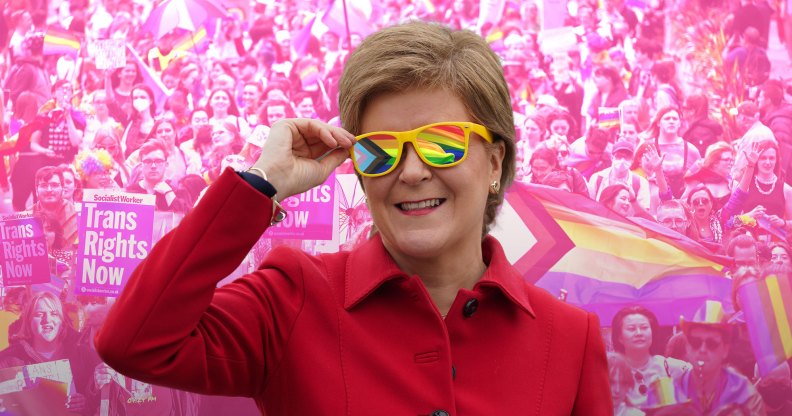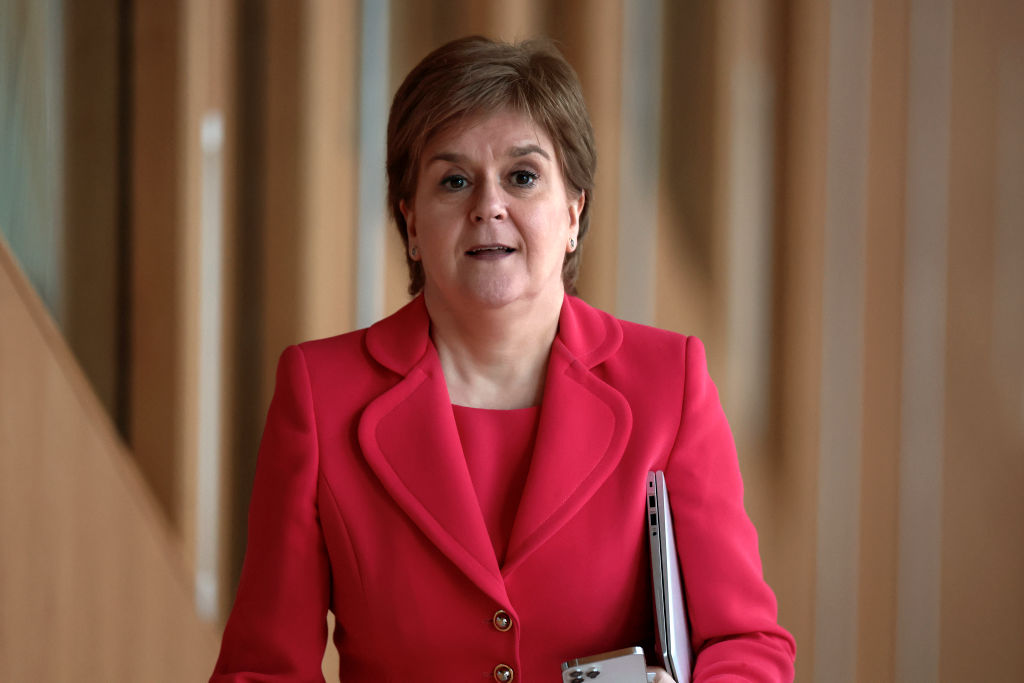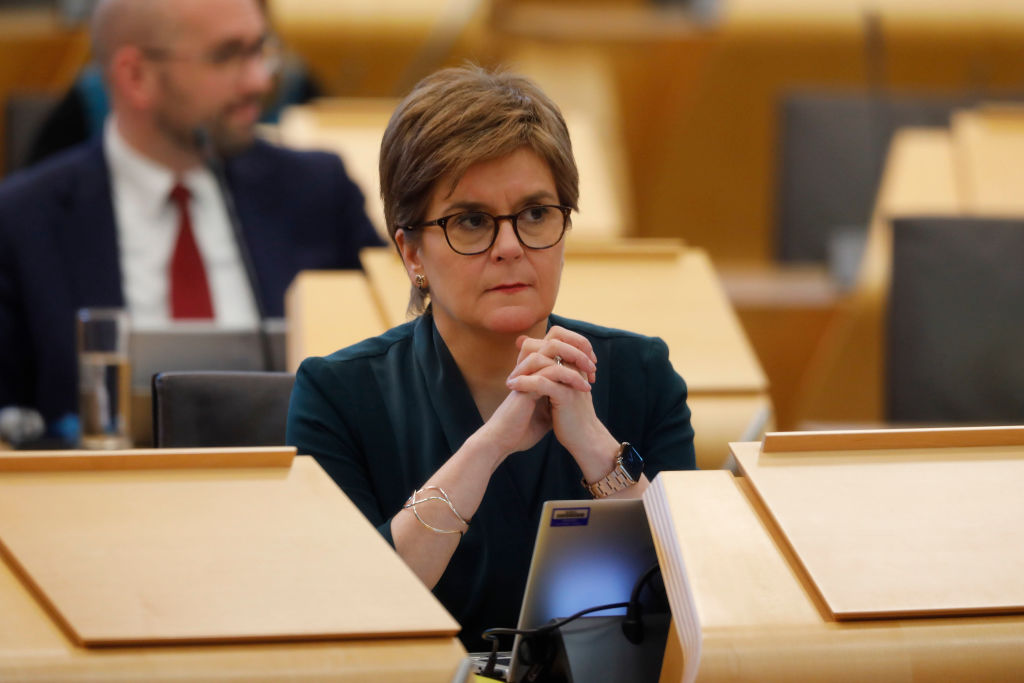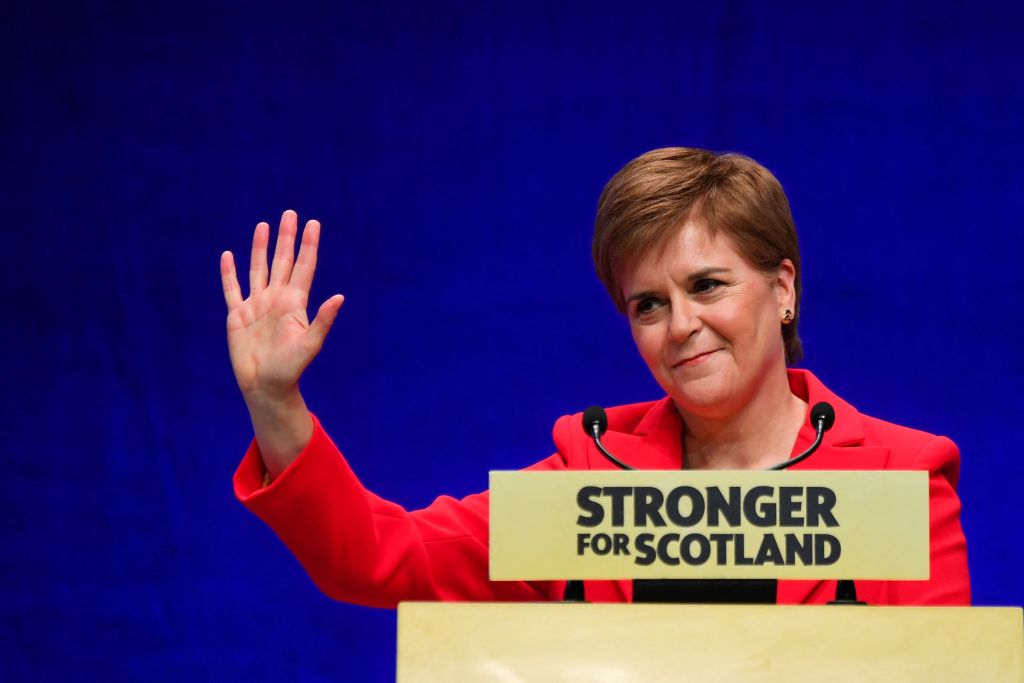Nicola Sturgeon’s LGBTQ+ legacy: The good, the bad and the unresolved

Nicola Sturgeon is resigning as Scotland’s first minister. (Getty)
As Nicola Sturgeon prepares to hand over to new SNP leader Humza Yousaf, she leaves behind a complicated but historic legacy of LGBTQ+ allyship.
Yousaf was declared the new leader of the SNP on Monday (27 May) and is set to be confirmed as Scotland’s new first minister on Tuesday.
It brings to an end Nicola Sturgeon’s eight-year term as leader. Before that, she served as deputy leader for another eight years.
Yousaf was seen as the continuity candidate, and shares many of his predecessor’s progressive views on LGBTQ+ rights.
During her time as first minister, Sturgeon has taken action to improve LGBTQ+ lives. Sturgeon was first minister when Holyrood voted to legalise sam- sex marriage in Scotland in 2014. Writing in PinkNews at the time, she said she it was one of her proudest days.
She was deputy first minister when Scotland introduced equal adoption rights in 2009.
Her attempts to improve trans rights are particularly notable. Sturgeon first committed to reforming gender recognition laws ahead of the 2016 Scottish election.
Sturgeon’s support for reform quickly made her enemies in the SNP. Some threatened to leave the party in protest against plans to introduce self-identification for trans people.
On the flip side, others threatened to quit because they felt the SNP wasn’t taking meaningful action to combat transphobia within the party.

Tensions reached fever pitch when former Out for Indy trans officer, Teddy Hope, quit the party in 2021 over the party’s “inaction” after “transphobic views” were voiced at a branch meeting in Bearsden.
As reports circulated of members quitting because of transphobia within the party, Sturgeon spoke out in support of trans rights in a video posted to Twitter.
In the video, Sturgeon said it wasn’t acceptable to her that trans people didn’t view the party as a safe space, and promised to rid the SNP of transphobia.
“Yes, we have differences of opinion on gender-recognition reform – we should debate them openly and respectfully – but no debate can be a cover for transphobia,” she said.
“Trans people have as much right as any of us to be safe, secure and valued for who they are. Transphobia is wrong and we must treat it with the zero tolerance we treat racism or homophobia.”
Concerns remain about transphobia within the SNP’s ranks – announcing her resignation, Sturgeon said she would continue to advocate for equality from the backbenches.
Nicola Sturgeon said gender recognition reform would make trans lives ‘easier’
As the world finally got a handle on the COVID-19 pandemic, the Scottish government’s plans to reform the Gender Recognition Act (GRA) were put back on the table.

The bill was to remove barriers to accessing a Gender Recognition Certificate (GRC), the document which allows a trans person’s gender to be recorded on their birth, death, marriage and civil partnership certificate. It would have removed the requirement for a medical diagnosis of gender dysphoria, and would have lowered the age limit to 16, among other things.
The bill was passed in December 2022. Speaking in the Scottish parliament shortly beforehand, Sturgeon said it would make trans people’s lives “that little bit better and easier”.
But within days, the UK government indicated that it was planning to block the legislation using Section 35 of Scotland Act.
It was a devastating blow, but Sturgeon and the Scottish government refused to take Westminster’s threats lying down. She promised she would take legal action to challenge the UK government’s unprecedented move, and Yousaf has said he will see this through.
Sturgeon vociferously defended her gender recognition reforms even as the media and Westminster MPs turned their backs on her.
In a January appearance on Sunday with Laura Kuenssberg, Sturgeon hit back at claims that reforms would lead to “predatory men” attacking vulnerable women.
“The fear that women have about predatory men accessing women-only spaces to abuse and attack women is very real,” Sturgeon said.

“[But] you don’t have to show your birth certificate to access women-only spaces. So the point is this bill does not give a predatory man any more ability to abuse women than that predatory man already has.”
At the start of the year, Sturgeon was forced to defend herself and her stance on gender recognition following the conviction of Isla Bryson. Bryson raped two women before coming out as a trans woman.
Bryson was remanded to Cornton Vale women’s prison in Stirling after being convicted of carrying out the rapes, which took place in 2016 and 2019.
A review found Bryson did not come into contact with any other inmates during her time at Cornton Vale. She was placed in a men’s prison following assessment, which Sturgeon said was the correct decision. She also suggested Bryson may not actually be trans.
Sturgeon has denied that the backlash she has faced over the case pushed her to resign.
But it’s certainly highlighted that a faction of her party opposes her views on trans rights. A number of MSPs have criticised her government over policy regarding prisoners, and just months ago, seven SNP MSPs voted against the Gender Recognition Reform bill, with two abstaining.
As she prepares to leave the position behind many LGBTQ+ people will remember her leadership as a compassionate one in an era characterised by hate.
Gender recognition reform might not be a reality in Scotland just yet, but there’s no denying the fact that Sturgeon pursued it relentlessly – in the face of all opposition.
How did this story make you feel?

